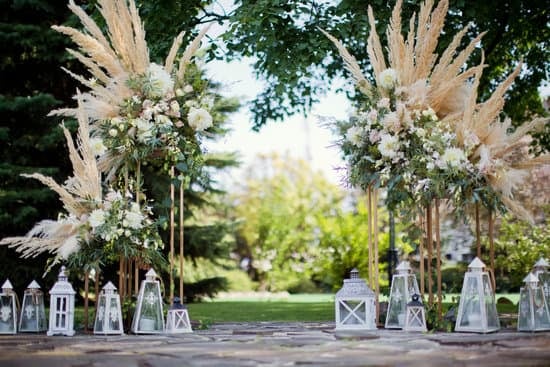Wedding rings hold a deep cultural significance in various countries around the world, representing love, commitment, and the bond between two individuals. One question that often arises is whether Chinese people wear wedding rings. In this article, we will delve into the fascinating world of Chinese marriage traditions and explore the customs and rituals associated with weddings throughout history.
China is a country rich in history and tradition, and its marriage customs have evolved over centuries. From traditional Chinese wedding jewelry to the influence of Western culture on modern wedding practices, there is much to uncover about the role of wedding rings in Chinese culture. We will also examine how attitudes towards wedding rings have changed in China over time and discuss the symbolic meaning of these rings within the context of Chinese traditions.
Join us on a journey through the intricacies of Chinese marriage customs as we delve into the history, symbolism, and evolving practices related to wedding rings in this vibrant and diverse culture. By gaining insight into this aspect of Chinese society, we can better appreciate the significance of wedding rings within a global context.
History of Chinese Marriage Traditions
The history of Chinese marriage traditions is rich and diverse, with numerous customs and rituals that have been practiced for centuries. In traditional Chinese culture, marriage was not just the union of two individuals, but also the merging of two families. As such, weddings were elaborate affairs involving various ceremonies and traditions to symbolize the joining of the bride and groom and their families. These customs varied across different regions in China, but they all held deep cultural significance.
Traditional Wedding Ceremonies
One of the most well-known traditional Chinese wedding rituals is the Tea Ceremony, where the bride and groom serve tea to their parents as a sign of respect and gratitude. This ceremony represents the formal introduction of the bride to her new family and is an essential part of Chinese wedding customs.
In addition to this, other customary practices include exchanging gifts, performing various rituals at ancestral altars, and participating in symbolic rituals such as firecrackers to ward off evil spirits.
Ancient Wedding Attire
In ancient China, brides typically wore a red qipao or cheongsam as their wedding dress, which symbolized joy and good luck. The color red is significant in Chinese culture as it represents happiness and prosperity. Brides would also adorn themselves with traditional jewelry such as gold bracelets, necklaces, and hair accessories. The groom would wear a black silk robe with intricate embroidery along with a black hat or cap symbolizing his responsibilities as a husband.
Throughout history, these traditions have reflected the values and beliefs of Chinese society at different periods. However, with the influence of modernity and globalization, some aspects of traditional Chinese weddings including wedding rings have evolved over time.
Traditional Chinese Wedding Jewelry
When it comes to traditional Chinese wedding jewelry, there are several specific pieces that hold cultural significance and are commonly worn by brides and grooms. These pieces not only reflect the rich history of Chinese marriage traditions but also symbolize various aspects of the union between two individuals. Here are some examples of traditional Chinese wedding jewelry:
1. Dragon and Phoenix Bracelet: This bracelet is a common piece worn by Chinese brides, symbolizing the harmony between the bride and groom. The dragon represents the groom, while the phoenix represents the bride, signifying their complementary roles in the marriage.
2. Double Happiness Necklace: The “Double Happiness” symbol is often incorporated into traditional Chinese wedding jewelry, including necklaces. This symbol is associated with joy and marital bliss, making it a cherished piece for couples embarking on their journey together.
3. Jade Jewelry: Jade holds great significance in Chinese culture and is often incorporated into wedding jewelry. From jade bangles to earrings and pendants, this precious stone symbolizes purity, integrity, and love – making it a popular choice for bridal adornments.
The influence of Western culture on Chinese wedding practices has led to the adoption of certain Western traditions, including the use of wedding rings. While traditional Chinese wedding jewelry continues to be an integral part of the ceremony, many modern couples also exchange wedding rings as a symbol of their commitment and love for each other.
Symbolism of Wedding Rings in Chinese Culture
In Chinese culture, wedding rings have come to symbolize eternity and unity between husband and wife. The circular shape of the ring represents unending love, while the exchange of rings during the wedding ceremony signifies the couple’s lifelong commitment to each other. This symbolic meaning has become deeply ingrained in modern Chinese marriage customs, emphasizing the importance of this tradition in contemporary society.
Influence of Western Culture
The influence of Western culture on Chinese wedding practices, including the adoption of wedding rings, reflects the ever-changing nature of cultural traditions in China. Throughout history, Chinese marriage customs have been deeply rooted in traditional rituals and symbolic gestures, with little emphasis on the exchange of rings. However, as globalization and modernization have become more prevalent in China, there has been a noticeable shift towards incorporating Western elements into traditional ceremonies.
In recent years, the presence of wedding rings in Chinese marital unions has become increasingly common, particularly in urban areas where Western influences are most prominent. The symbolism of the ring as a token of eternal love and commitment has resonated with many couples in China, leading to a growing trend of including this practice in their wedding ceremonies.
As a result, jewelry brands both domestic and international have begun catering to this new demand for wedding rings among Chinese consumers.
Despite this trend, it is worth noting that not all Chinese couples choose to exchange wedding rings. In some cases, traditional cultural values still hold significant sway over marital customs, and certain regions within China may adhere more strictly to these age-old traditions. As a result, there remains a noticeable contrast in attitudes towards wedding rings across different parts of the country.
Lastly but not least important data shows that over 80% pf people surveyed buy their weddding rings frmo a physical store or offilive retailors verses less than 20% who shop online.
| Chinese Wedding Ring Shopping Preference | Percentage |
|---|---|
| Physical Store/Retailers | 80% |
| Online Retailers | 20% |
Modern Chinese Wedding Rings
In traditional Chinese culture, wedding rings were not a common practice. In fact, the concept of exchanging wedding rings as a symbol of marriage was not widely embraced until more recently with the influence of Western traditions. However, as Chinese society becomes increasingly globalized, the trend of exchanging wedding rings has gained popularity among modern couples.
The younger generation of Chinese couples are now more likely to exchange wedding rings as a part of their marriage ceremony. This shift in cultural norms can be attributed to the exposure to Western media and the desire to incorporate modern elements into traditional practices. As a result, many jewelry stores in China now offer a wide range of wedding ring designs to cater to this growing demand.
One interesting aspect of modern Chinese wedding ring trends is the emphasis on customizing rings to reflect personal preferences and unique styles. Couples often opt for engraved initials or meaningful symbols on their wedding bands as a way to personalize this significant piece of jewelry. Additionally, there is a growing preference for matching wedding ring sets that symbolize unity and harmony within the marriage.
| Chinese Wedding Ring Trends | Details |
|---|---|
| Adoption of Western Traditions | Increasing popularity of exchanging wedding rings influenced by Western culture |
| Personalization | Trend towards engraving initials or symbols on wedding bands |
| Matching Sets | Growing preference for matching wedding ring sets symbolizing unity and harmony |
Symbolism of Wedding Rings in Chinese Culture
Historical Significance of Wedding Rings
In Chinese culture, the exchange of wedding rings has not been traditionally practiced. Instead, couples have exchanged other forms of jewelry such as bracelets and necklaces to symbolize their union. These items often hold deep cultural and symbolic significance, with intricate designs and materials chosen for their auspicious meanings. However, in recent years, the influence of Western culture has led to a growing trend of incorporating wedding rings into Chinese marriage traditions.
Transformation of Symbolic Meaning
The symbolic meaning of wedding rings in the context of Chinese traditions has evolved as a result of the influence of Western culture. While traditional Chinese wedding jewelry carries its own profound symbolism, such as representing eternity and prosperity, the introduction of wedding rings has added new layers to the symbolism associated with marriage. Couples now view wedding rings as a symbol of love, commitment, and unity in line with global norms.
Contemporary Views on Wedding Rings
As more young Chinese couples embrace modern concepts of romance and marriage, the adoption of wedding rings has become increasingly popular. Many couples now view wearing wedding rings as a gesture that reflects their commitment to one another and their desire to participate in global matrimonial customs. Moreover, the exchange of wedding rings serves as a tangible symbol that aligns with contemporary perceptions of marriage and love within Chinese society.
By exploring the evolving significance and adoption of wedding rings in China, it becomes evident that cultural practices are subject to change over time due to various influences. The decision to incorporate wedding rings into Chinese marriage traditions reflects a blending of cultural values and an openness to embracing diverse customs from around the world.
Differences in Wedding Ring Customs Across China
In a country as diverse as China, the customs and traditions related to weddings can vary significantly from region to region. This is also true when it comes to the wearing of wedding rings, where different areas may have their own unique practices and beliefs. Here are some key differences in wedding ring customs across China:
- In Northern China, it is common for both the bride and groom to wear matching gold bands as a symbol of their union. These rings are often simple in design, but hold great significance in representing the commitment between the couple.
- In Southern China, particularly in regions with strong Cantonese influences, it is more common for the bride to receive a set of jewelry known as “Si Dian Jin.” This traditional gift from the groom’s family often includes a ring along with other gold accessories, symbolizing the groom’s love and commitment to his bride.
- In some ethnic minority communities within China, such as those from Tibet or Xinjiang, wedding ring customs may differ even further. For example, Tibetan weddings may involve the exchange of amulet rings with intricate designs that hold spiritual significance within their culture.
It’s important to note that these are just a few examples of the varying customs related to wedding rings across different regions of China. The rich tapestry of Chinese culture means that there are countless other traditions and beliefs surrounding marriage and love, each adding to the unique mosaic of this ancient civilization.
Conclusion
In conclusion, the cultural significance of wedding rings in China has evolved over time, reflecting a combination of traditional customs and modern influences. While historically Chinese weddings did not include the exchange of wedding rings, the influence of Western culture has led to the adoption of this practice in many parts of China. Today, many young Chinese couples choose to exchange wedding rings as a symbol of their commitment and love for each other.
The symbolism of wedding rings in Chinese culture has also become an important aspect of modern marriage traditions. The circular shape of the ring represents eternity and unending love, while the act of exchanging rings is seen as a deeply meaningful gesture. This blending of traditional symbolism with contemporary practices demonstrates the enduring significance of marriage rituals in Chinese society.
Moreover, it is important to note that there are variations in wedding ring customs across different regions of China, highlighting the diversity within Chinese culture. Despite these regional differences, the increasing popularity of wedding rings among Chinese couples reflects a global trend towards embracing universal symbols of love and commitment. Ultimately, whether or not Chinese people wear wedding rings is not only a matter of tradition but also an expression of personal values and beliefs.
Frequently Asked Questions
Do Chinese Get Engagement Rings?
Yes, Chinese couples do exchange engagement rings as a symbol of their commitment to each other. This tradition has become increasingly popular in China, with many couples choosing to follow the Western custom of presenting engagement rings during the proposal or engagement ceremony.
Who Buys the Wedding Rings Chinese?
In Chinese culture, it is customary for the groom’s family to purchase the wedding rings. The wedding rings are often considered part of the bride price, which the groom pays to the bride’s family as a traditional practice. However, modern Chinese couples may choose to purchase the rings themselves or split the cost between both families.
Do Any Cultures Wear Wedding Ring on Right Hand?
Yes, there are several cultures that wear wedding rings on the right hand. For example, in many Eastern European countries such as Russia, Ukraine, and Greece, couples traditionally wear their wedding bands on their right hand.
This practice is based on historical and cultural traditions specific to each region. In these cultures, wearing the wedding ring on the right hand carries significant meaning and symbolism related to marriage and commitment.

I have been involved in marriages for over 20 years helping couples and singles understand more about them.





